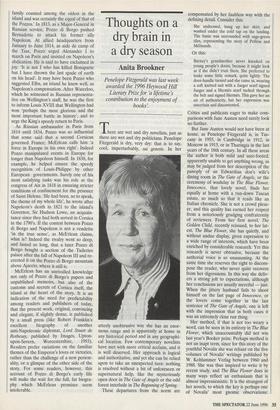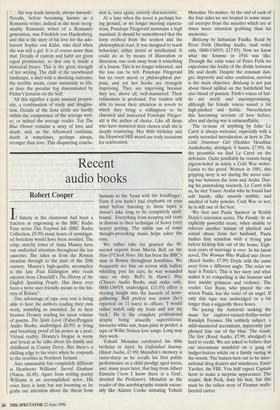Thoughts on a dry brain in a dry season
Anita Brookner
Penelope Fitzgerald was last week awarded the 1996 Heywood Hill Literary Prize for 'a lifetime's contribution to the enjoyment of books'.
There are wet and dry novelists, just as there are wet and dry politicians. Penelope Fitzgerald is dry, very dry: that is to say, cool, imperturbably, sui generic. In her utterly unobtrusive way she has an enor- mous range and is apparently at home in any historical period and in any geographi- cal location. Few contemporary novelists have met with more critical acclaim, and it is well deserved. Her approach is logical and authoritative, and yet she can be relied upon to take an unexpected turn: nothing is resolved without a bit of unforeseen or supernatural help, like the mysteriously open door in The Gate of Angels or the odd forest interlude in The Beginning of Spring.
These departures from the norm are compensated by her faultless way with the defining detail. Consider this:
She undressed, hung up her skirt, and washed under the cold tap on the landing. The basin was surrounded with sage-green tiles, representing the story of Pelleas and Melisande.
Or this:
Barney's grandmother never knocked on young people's doors, because it might look as if she didn't trust them. She preferred to make some little remark, quite lightly. The door-handle turned and she came in, wearing a soft knitted suit with a Jaeger scarf signed Jaeger and a Hermes scarf tucked through the belt and signed Hermes. This gave her an air of authenticity, but her expression was uncertain and discontented.
Critics and publicists eager to make com- parisons with Jane Austen need surely look no further.
But Jane Austen would not have been at home, as Penelope Fitzgerald is, in Tus- cany in 1955, in Cambridge in 1912, in Moscow in 1913, or in Thuringia in the last years of the 18th century. In all these areas the author is both mild and sure-footed, apparently unable to get anything wrong, as may be judged from her description of the panoply of an Edwardian don's wife's dining room in The Gate of Angels, or the ceremony of washday in The Blue Flower. Innocence, that lovely novel, finds her equally at home with a run-down Tuscan estate, so much so that it reads like an Italian chronicle. She is not a crowd pleas- er, and this quality has earned her respect from a notoriously grudging confraternity of reviewers. From her first novel, The Golden Child, recently reissued, to her lat- est, The Blue Flower, she has quietly, and without undue display, given expression to a wide range of interests, which have been enriched by considerable research. Yet this research is never obtrusive, because the authorial voice is so unassuming. At the same time she reserves the right to discom- pose the reader, who never quite recovers from her digressions. In this way she deliv- ers a strong jolt to expectations, although her conclusions are usually merciful — just. When the jittery husband fails to shoot himself on the last page of Innocence, or the lovers come together in the last sentence of The Gate of Angels, one is left with the impression that in both cases it was an extremely close run thing.
Her method, if that is not too weary a word, can be seen in its entirety in The Blue Flower, which unaccountably did not win last year's Booker prize. Perhaps method is not an inapt term, since for this story of the youthful Novalis she was reliant on the five volumes of Novalis' writings published by W. Kohlammer Verlag between 1960 and 1988. She was thus inspired to write it by recent study, and The Blue Flower does in many ways reflect an enthusiasm that is almost impressionistic. It is the strangest of her novels, to which the key is perhaps one of Novalis' most gnomic observations: `. . . the way leads inwards, always inwards'. Novalis, before becoming known as a Romantic writer, indeed as the most recog- nisably Romantic writer of a Romantic generation, was Friedrich von Hardenberg, and this is the story of his love for the ado- lescent Sophie von Kuhn, who died when she was still a girl. It is of course more than that. Details of custom and habit are given equal prominence, so that one is inside a historical fresco. This is the great strength of her writing. The chill of the snowbound landscape, a duel with a shocking outcome, the terrible meals, come insistently to life, as does the peculiar fog disseminated by Fichte's lectures on the Self.
All this signifies a quite unusual propen- sity, a combination of study and imagina- tion. Details of the Jena circle are hardly within the competence of the average writ- er, or indeed the average reader. Yet The Blue Flower remains a story of love and death, and, as the Afterword confirms, death is sometimes, perhaps always, stronger than love. This disquieting conclu- sion is, once again, entirely characteristic.
At a time when the novel is perhaps los- ing ground, or no longer meeting expecta- tions, Penelope Fitzgerald maintains a high standard. It should be remembered that the form evolved from the sermon and the philosophical tract. It was designed to teach behaviour, either moral or intellectual. It could do so by means of illustration or diversion; one took away from it something of a lesson. This is no longer tolerated, and the loss can be felt. Penelope Fitzgerald has no overt moral or philosophical pur- pose, and yet her books are strangely improving. They are improving because they are, above all, well-mannered. Their refinement is profound. For readers still able to invest their attention in novels to which they bring a willingness to be charmed and instructed Penelope Fitzger- ald is the author of choice. Like all those who have mastered their chosen craft she is deeply reassuring. Her 80th birthday and the Heywood Hill award are truly occasions for celebration.



























































 Previous page
Previous page